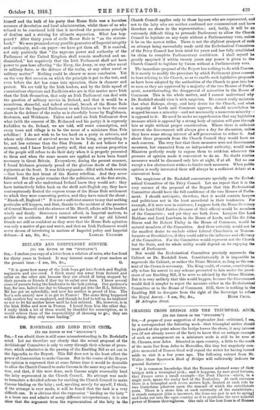DR. ItASHDALL AND LORD HUGH CECIL.
ITO TER EDITOR OP THE " SPECTATOR.") Strt,—I am afraid there is still some misunderstanding in Dr. Rashdall's mind. Let me therefore say clearly that the actual proposal of the Archbishops' Committee is only to carry through their scheme of proce- dure, which culminates in the passing of the Enabling Bill as set out in the Appendix to the Report. This Bill does not in the least affect the power of Convocation to make Canons. But in the course of the Report the opinion is expressed that at some future time it would be desirable to allow the Church Council to make Canons in the same way as Convooa- tion, and that, if this were done, such Canons might reasonably bind the laity represented in the Church CounciL No attempt was made to formulate a detailed scheme for enabling the Church Council to make Canons binding on the laity ; and, speaking merely for myself, I think, If the attempt is ever made, it will be found that the task is a very difficult one. It is obvious that the expression "binding on the laity" is a loose one and admits of many different interpretations ; it is also clear that the argument from the representation of the laity in the Church Council applies only to those laymen who are represented, and not to the laity who are neither confirmed nor communicant and have therefore no share in the representation ; and, lastly, it will be an extremely difficult thing to persuade Parliament to allow the Church Council to legislate on any topic without a Parliamentary veto, unless it be an the merest trifles. There is not the slightest prospect of such an attempt being successfully made until the Ecclesiastical Committee of the Privy Council has been tried for years and has fully established its claim to complete Parliamentary confidence. I shall myself be greatly surprised if within twenty years any power is given to the Church Council to legislate by Canon without a Parliamentary veto.
The immediate proposal of the Report has nothing to do with Canons. It is merely to modify the procedure by which Parliament gives consent to laws relating to the Church, so as to enable such legislative proposals as have been adopted by the authorities of the Church to pass into law so soon as they are approved by a majority of the two Houses of Parlia- ment, notwithstanding the disapproval of minorities In the House of Commons. This is the whole matter, and I cannot understand why Dr. Rashdall should view it with suspicion. Ho cannot really maintain that what Bishops, clergy, and laity desire for the Church, and what a majority of Lords and Commons approve, should nevertheless b. stopped because a minority—and not necessarily a numerous minority— is opposed to it. He need be under no apprehension that any legislative measure which is opposed by a strong body of opinion will pass through late at night without proper consideration. Whore there is sufficient interest the Government will always giro a day for discussion, unless they have some strong interest of self-preservation to refuse it. And about these proposals from the Church Council they would have no such concern. The very fact that them measures were not Government measures, but emanated from an independent authority, would make Ministers perfectly ready to expose them to criticism whenever the pressure of opinion made it convenient to do so. No doubt routine measures would be discussed only late at night, if at all. But no one except a few obstructives wishes to hinder such measures. When publics opinion is really interested there will always be a sufficient debate at a convenient hour.
The suspicions of Dr. Rashdall concentrate specially on the Ecclesi- astical Committee of the Privy Council. Let me repeat that it is the very essence of the proposal of the Report that this Ecclesiastical Committee should have the full confidence of the two Houses of Parlia- ment. I should anticipate, therefore, that it would contain lawyers and politicians not in the least sacerdotal in their tendencies. For example, if it were now in existence, I suppose both the Home Secretary and the Lord Chief Justice (because of their offices) would be members of the Committee ; and yet they are both Jews. Lawyers like Lord Haldane and Lord Loreburn in the House of Lords, and like Sir John Simon and Sir Robert Finlay in the House of Commons, would be natural members of the Committee. And there certainly would not be the smallest desire to exclude either Liberal Churchmen or Noncon- formists or Freethinkers, if they could add to the influence and efficiency of the Committee. For the Committee would represent not the Church but the State, and its whole utility would depend on its enjoying the trust of Parliament.
Nor would the Ecclesiastical Committee precisely supersede the Cabinet as Dr. Rashdall fears. Constitutionally it is impossible to supersede the Cabinet, or rather lhe Prime Minister, so long as the con- sent of the Crown is necessary. The King could, of course, constitution- ally refuse his assent to any scheme presented to him under the provi- sions of our Enabling Bill, if he were so advised by the Primo Minister. But it is very unlikely that this would happen, because the Government would find it simpler to reject the measure either in the Ecclesiastical Committee or in the House of Commons. Still, them is nothing in the Enabling Bill to derogate from the right of the Sovereign to refuse [ho Royal Assent.—I am, Sir, &a., Hums Caen., 20 Arlington Street.


































 Previous page
Previous page